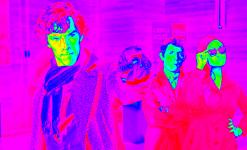That is true, but you use already that scientific information to evaluate these things. Most of these things have been studied scientifically and if you can apply that knowledge to see if these things are working. Also, if you have spent much of time in physical field and taken courses and broaden your knowledge then you can call that "common sense" accurate. |
|
Results 26 to 50 of 55
Thread: any p90xers here?
-
10-01-2011 05:39 AM #26
Well, MY point was that a lot of things seems like common sense, but our common sense is a lot of the time incredibly incorrect.

-
10-01-2011 12:21 PM #27Rain On Your Roof Achievements:






- Join Date
- Dec 2008
- LD Count
- Lost count.
- Gender

- Location
- Where angels fear to tread
- Posts
- 1,228
- Likes
- 256
Jujutsu is the gentle art. It's the art where a small man is going to prove to you, no matter how strong you are, no matter how mad you get, that you're going to have to accept defeat. That's what jujutsu is.
-
10-01-2011 01:47 PM #28
That might be true, the second bit of your post. But I don't think it's going to be anything amazing that you couldn't achieve with any other normal exercises.

-
10-01-2011 08:28 PM #29Member Achievements:




- Join Date
- Sep 2004
- Gender

- Location
- Seattle, WA
- Posts
- 2,503
- Likes
- 217
I'm about to make a super geeky analogy: Training a neural network.
If you're teaching a neural net to do text recognition (one letter at a time, for simplicity), you need to feed it lots of samples with correct answers (e.g. "<sample writing> - this is an R").
As you feed it more and more samples, it will learn to recognize other stuff.
But there is a difference in what order you feed it the samples. If you have 100 samples of each letter, you want to mix it up. If you feed it 100 Rs, then 100 Bs, etc. it will grow differently than if you feed random letters in random order (2600 samples, in no particular order). It will be MUCH more effective and versatile if you trained it by mixing it up early on.
I think this is a really great analogy to learning, as well as physical fitness. It's not a "scientific proof" by any stretch, but it's a kind of reasoning why "mixing it up" is better than "doing the same thing over and over for a LONG time and then changing it and then doing the same thing over and over, etc."
But I think the way they talk about "muscle confusion theory" is misleading. Yes, it's good to mix it up, and I wouldn't be shocked if the way they change the workouts and ordering around DID make a huge difference. I DID find that after the first few weeks, when I switched over to the second set (which is just a replacement of the weight training modules, to cover different muscle groups together, with slightly different exercises), the workouts became a lot harder for a while (as was the case when switching back to the original model).
But it just comes down to switching it up a lot, rather than optimizing your body for one specific workout.
But I think it's more about balanced growth, than it is about "your muscles will get bigger and stronger faster if you confuse them" - THAT statement, I think is bs.
-
10-02-2011 12:53 PM #30
From Mark Rippetoe: "It works very well since it is most people’s first exposure to an exercise protocol that’s supposed to be hard, and the impression of most inexperienced people who have tried it is very positive. P90X works well for the same reason, as does HIT, Turbo-Jam, the first week of football practice, and all participation in the first phases of any reasonably challenging sport. A strenuous physical effort – no matter what it is – acts as a stimulus for adaptation, up until the point that the adaptation occurs and the program fails to further progressively load."
ME TRANSMITTE SURSUM, CALEDONI!
-
10-02-2011 01:21 PM #31
-
10-20-2011 08:16 AM #32Member


- Join Date
- Apr 2007
- Gender

- Location
- Victoria B.C. Canada
- Posts
- 2,868
- Likes
- 60
I love doing plyometrics! Just yesterday when i was doing it i was going mega hard, i even started before they even started on the DVD. I drank 9 cups of water during that 1 hour workout, and drained about 3 cups of sweat. I was not even half assing it, i was moving my body as fast as i could go for most of the workout. It was killer but it felt gooooood. When it came to break time, i just did jumping jacks as fast as i could, or running in the spot with knees up high moving as fast as i could. Today at work my boss told me i've lost so much weight (40 pounds since January?). I would have lost alot more but i'm still slacking off in the nutrition department...i don't know how to cook and learning bores me, but i'll just have to suck it up. I fell to my knee, though. My heart felt like it was about to rip through my skin....they say bring it, so i bring it. Even if i pass out, which i have come close a few times.
-
12-11-2011 03:07 AM #33
Last edited by dave1701; 12-11-2011 at 08:13 PM.

"You Can't, You Won't And You Don't Stop"Lucid Goals: [Ask a DC: "Am I dreaming?"] [Ask a DC: "What are you?"]
-
12-11-2011 03:20 AM #34
-
12-11-2011 08:13 PM #35
-
12-12-2011 09:40 PM #36
Im considering trying this out myself now, as I dont want to cut to 155 for mma competition, I would rather stay at 170 with a more balanced body. At the last mma gym I went to, one guy who started coming was weighing 270 with a huge belly. Then he started p90x and after a semester of using it he was down to 210ish, and way stronger. It was crazy.
Now of course, Im only looking to get stronger, I already am pretty skinny. But I heard you can use it for either goal or both so it might be worth investigating to me because I dont really have time to drive to a gym between working 8 hours a day and going to mma 2 hours a day already :/ Id rather get the strength training done at home.
A warrior does not give up what he loves, he finds the love in what he does
Only those who attempt the absurd can achieve the impossible.
-
12-12-2011 11:08 PM #37
-
12-13-2011 06:45 AM #38Member Achievements:




- Join Date
- Sep 2004
- Gender

- Location
- Seattle, WA
- Posts
- 2,503
- Likes
- 217
By the way, do any of you guys think Tony Horton's one-liners are sometimes really, really creepy?
"I hear breathing... makes me happy"
-
12-14-2011 04:27 AM #39Member


- Join Date
- Apr 2007
- Gender

- Location
- Victoria B.C. Canada
- Posts
- 2,868
- Likes
- 60
Tip for you all...DON'T do pullups as fast as you can with those doorway pullup bars. Why? i tried it and almost broke my tailbone....it's bruised atm, still healing so some p90x things are hard to do with that pain, especially AB Ripper X.
As for what Replicon said...i don't listen to him, i heard you'll either like listening to him or you'll hate it so much. I haven't heard him before, i always use my ipod instead.
-
12-15-2011 03:14 AM #40
I have memorized virtually everything he says on Ab ripper x. Favorites from that one:
"Half way through, party's almost over man, what a bummer"
"Making contact! Jason's makin' contact elbow side!"
"Here we go, not gonna mess around"
"There's a no grab"
"This is WRONG, anybody can do this. THAT'S where the money is!"
"Harder, easier, easiest"
"You Can't, You Won't And You Don't Stop"Lucid Goals: [Ask a DC: "Am I dreaming?"] [Ask a DC: "What are you?"]
-
12-15-2011 06:55 AM #41Member Achievements:




- Join Date
- Sep 2004
- Gender

- Location
- Seattle, WA
- Posts
- 2,503
- Likes
- 217
"This is Pam, they call her BLAM"
"Geeeuuuhman potaaato souuuup"
-
12-16-2011 03:26 AM #42
"Touch the toes"

"You Can't, You Won't And You Don't Stop"Lucid Goals: [Ask a DC: "Am I dreaming?"] [Ask a DC: "What are you?"]
-
12-20-2011 01:02 AM #43
Is ab ripper x significantly better than doing a bunch of crunches?

"You Can't, You Won't And You Don't Stop"Lucid Goals: [Ask a DC: "Am I dreaming?"] [Ask a DC: "What are you?"]
-
12-20-2011 01:17 AM #44Member


- Join Date
- Apr 2007
- Gender

- Location
- Victoria B.C. Canada
- Posts
- 2,868
- Likes
- 60
-
12-20-2011 07:55 AM #45Member Achievements:




- Join Date
- Sep 2004
- Gender

- Location
- Seattle, WA
- Posts
- 2,503
- Likes
- 217
Yeah Ab Ripper X introduces a lot of variety, and works more muscles than just crunches.
-
02-02-2012 05:09 AM #46Member


- Join Date
- Apr 2007
- Gender

- Location
- Victoria B.C. Canada
- Posts
- 2,868
- Likes
- 60
Tony Horton is a BEAST! and he's only 53 years old.
TONY HORTON BEACH WORKOUT with Anne Kearns Fers.m4v - YouTube
-
02-02-2012 08:12 AM #47"O" will suffice. Achievements:










- Join Date
- Apr 2005
- LD Count
- 20+ Years Worth
- Gender

- Location
- Central Florida
- Posts
- 16,083
- Likes
- 4032
- DJ Entries
- 149
 Dream Journal: Dreamwalker Chronicles Latest Entry: 01/02/2016 - "Hallway to Haven" (Lucid)(Or see the very best of my journal entries @ dreamwalkerchronicles.blogspot)
Dream Journal: Dreamwalker Chronicles Latest Entry: 01/02/2016 - "Hallway to Haven" (Lucid)(Or see the very best of my journal entries @ dreamwalkerchronicles.blogspot)
-
02-10-2012 02:22 AM #48Member


- Join Date
- Apr 2007
- Gender

- Location
- Victoria B.C. Canada
- Posts
- 2,868
- Likes
- 60
MP45- Muscle Prodigy's Exclusive 45 Day Weight Loss & Muscle Building Program- Shred the Fat & Build the Body of Your Dreams!
Just wondering, is this site legit? any MP45ers on here, or heard of it? 45 days seems a bit fast.
-
06-03-2012 07:03 PM #49
My brother lent me the Ab Ripper X video. Just that one. I like it a lot but Tony's voice kind of annoys me. xD

-
06-03-2012 11:29 PM #50D.V. Editor-in-Chief


- Join Date
- Jun 2006
- LD Count
- Lucid Now
- Gender

- Location
- 3D
- Posts
- 8,263
- Likes
- 4139
- DJ Entries
- 11
I like their yoga routine. I'm not big on the host but I enjoy doing yoga with their routine on so I'm less likely to wimp out when it gets brutal
Everything works out in the end, sometimes even badly.





 5Likes
5Likes LinkBack URL
LinkBack URL About LinkBacks
About LinkBacks




 Reply With Quote
Reply With Quote


Bookmarks